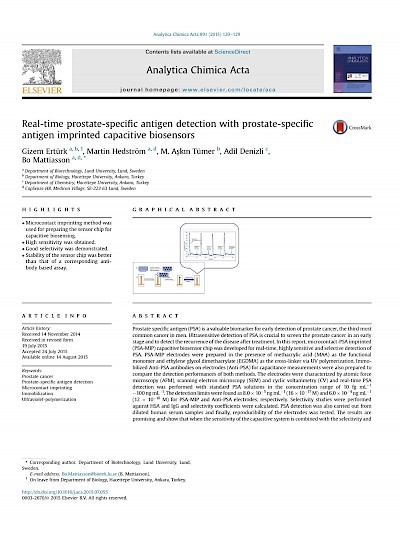New Article Published in Analytica Chimica Acta
Article is about, Real-time prostate-specific antigen detection with prostate-specific antigen imprinted capacitive biosensors
Abstract to this paper... Prostate specific antigen (PSA) is a valuable biomarker for early detection of prostate cancer, the third most common cancer in men. Ultrasensitive detection of PSA is crucial to screen the prostate cancer in an early stage and to detect the recurrence of the disease after treatment. In this report, microcontact-PSA imprinted (PSA-MIP) capacitive biosensor chip was developed for real-time, highly sensitive and selective detection of PSA. PSA-MIP electrodes were prepared in the presence of methacrylic acid (MAA) as the functional monomer and ethylene glycol dimethacrylate (EGDMA) as the cross-linker via UV polymerization. Immo- bilized Anti-PSA antibodies on electrodes (Anti-PSA) for capacitance measurements were also prepared to compare the detection performances of both methods. The electrodes were characterized by atomic force microscopy (AFM), scanning electron microscopy (SEM) and cyclic voltammetry (CV) and real-time PSA detection was performed with standard PSA solutions in the concentration range of 10 fg mL 1 e100 ng mL 1. The detection limits were found as 8.0 10 5 ng mL 1 (16 10 17 M) and 6.0 10 4 ng mL 1 (12 10 16 M) for PSA-MIP and Anti-PSA electrodes, respectively. Selectivity studies were performed against HSA and IgG and selectivity coefficients were calculated. PSA detection was also carried out from diluted human serum samples and finally, reproducibility of the electrodes was tested. The results are promising and show that when the sensitivity of the capacitive system is combined with the selectivity and reproducibility of the microcontact-imprinting procedure, the resulting system might be used successfully for real-time detection of various analytes even in very low concentrations.

